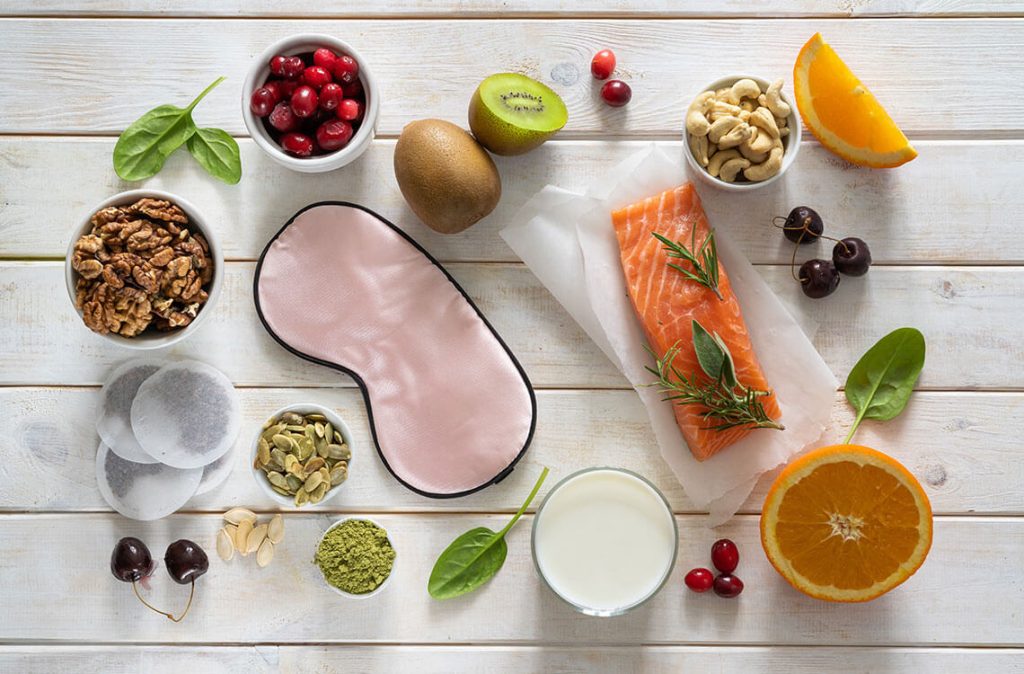Contrary to popular belief, diets are not just for weight loss (or weight gain).
By making a few tiny tweaks to your daily meals and menu, you can adjust your health in many profound and life-changing ways.
There are diets for healthy, acne-free skin, diets to improve eyesight, diets to help with gastrointestinal conditions like irritable bowel syndrome (IBS), diets to help prevent cancer, diets to improve depression and anxiety, and even diets to promote and heal fertility.
If you’re having insomnia, lay off those melatonin pills in the meantime.
Because you may just be able to fix your sleep schedule.
And what if I told you that good sleep is not found in the bedroom but the kitchen?
Here’s how you plan a foolproof sleep-friendly diet that will help you get in those precious 7 hours of shuteye in no time.
Carbs for Sleep
This may delight our fellow Malaysians but white rice has been shown to greatly aid with sleep.
Especially eaten four hours before bed. More so than brown rice.
Be sure to consume in moderation, however, especially when taken before bedtime.
And if you can afford it, opt for basmati rice which is a bit healthier than regular white rice.
Other forms of complex carbs that you can consume throughout the day and especially before bedtime is oatmeal.
Just remember to make them sugar-free to avoid spiking your blood sugar.
Protein for Sleep
To maximise your sleep quality, opt for fast-digesting proteins like eggs (with the yolks left in), and fish such as sardines, tuna and salmon.
Another animal protein that you may not think can help with sleep is turkey.
While it may not be widely available in Malaysia, you can get turkey slices in the form of cured or deli meats.
However, due to their high salt content, be sure to eat these only in moderation or find healthier alternatives that do not contain a lot of nitrates.
Go for foods which are high in vitamin D as well, like mushrooms or milk.
Vegetables for Sleep
Eating more fruits and veggies in general have been associated with better sleep quality overall.
But some have more sleep-inducing properties than others.
Lettuce, for instance, contains a chemical called lactucarium which has sedative properties due to its similarity to opium.
Carrots, kale, spinach, broccoli, pumpkin edamame (fresh soy beans) and sweet potatoes are also particularly potent for helping you get sufficient shuteye.
These veggies are a rich source of alpha-carotene, calcium, magnesium, lycopene, tryptophan, choline and vitamin B6.
Other Foods for Sleep
Another fan favourite when it comes to foods that help with sleep is tart cherry juice, which contains possibly the largest amount of tryptophan of any foods.
It can actually be hard to procure in Malaysia unless you buy online or go to specific health and wellness stores, but not impossible.
Other foods that help with sleep include dairy products like malted milks and Greek yoghurt, nuts (particularly walnuts, cashews and pistachio) and some herbal teas such as chamomile, valerian, and passionflower, or a combination of these.
Sleep-Ruining Foods to Avoid
On the other side of the spectrum, you also have foods that actually ruin your sleep.
Making it hard to fall asleep, decreasing sleep quality, or reducing your sleep duration overall.
Try reducing these foods.
Especially a few hours before going to bed to increase your chances of getting a good night’s sleep
Coffee
The first is, of course, coffee.
Coffee is often the main culprit when it comes to poor sleep.
It’s long been associated with insomnia and poor sleep quality.
But there is a way to make it work for you and actually help you fall asleep faster.
The trick is to drink coffee only in the morning, after a protein-rich meal instead of an empty stomach.
This pushes back your sleepiness further into the day where it will accumulate and make you so tired, you’ll fall asleep instantly the moment your head hits the pillow.
Alcohol
Another beverage to avoid for better sleep is alcohol.
If you’re a social or habitual drinker, you may find that alcohol actually helps you fall asleep better.
However, it may not be quality sleep, as it prevents your body from truly resting throughout the night.
Sugar
Sugar is another huge culprit on this list.
Anything that spikes your blood sugar too much before bed will have you experiencing a sugar rush. Making it difficult to sleep overall.
If you still desire something sweet before bed, opt for a sweet drink made with sugar replacements that won’t spike your blood sugar.
Spicy Food
Spicy foods are something that few people realise can negatively impact sleep.
But it has less to do with anything that can disrupt your sleep hormone and more about what it does to your body.
Spicy goods can cause conditions that make it hard to fall or stay asleep such as raised body temperature and indigestion.
So be sure to avoid eating anything spicy four to six hours before sleep.
Eat Your Way to Better Sleep
Incorporating sleep-friendly foods into your diet is a simple yet effective way to improve your sleep quality and overall wellbeing.
The connection between nutrition and sleep is undeniable, and making mindful choices can lead to more restful nights.
Remember, a balanced diet, coupled with good sleep hygiene practices, can pave the way for a rejuvenated and energised tomorrow.
So, start making those delicious and nutritious choices today, and let your diet become a powerful ally in your quest for better sleep.
Sweet dreams!
Disclaimer: The information provided in this article is for informational purposes only and should not be considered as medical advice from Motherhood. For any health-related concerns, it is advisable to consult with a qualified healthcare professional or medical practitioner.
For more insightful stories and fun recipes, stay tuned to Motherhood Story!
